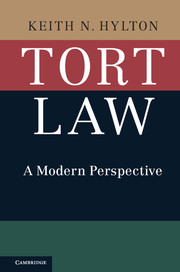Book contents
- Frontmatter
- Contents
- 1 Introduction
- 2 Policy and Tort Law
- 3 Evolution of Tort Law
- 4 Intentional Torts
- 5 Theoretical Foundations of Strict Liability
- 6 The Reasonable Person
- 7 Customs, Statutes, and the Reasonable Person
- 8 Inferring Negligence
- 9 Contributory Negligence and Assumption of Risk
- 10 Contributory Negligence, Comparative Negligence, and Incentives for Care
- 11 Joint and Several Liability, and Vicarious Liability
- 12 Factual Causation
- 13 Proximate Cause
- 14 Duty to Rescue and Special Relationships
- 15 Strict Liability: Conversion, Abnormally Dangerous Activities, and Nuisance
- 16 Defamation
- 17 Products Liability
- 18 Damages
- Index
16 - Defamation
Published online by Cambridge University Press: 05 June 2016
- Frontmatter
- Contents
- 1 Introduction
- 2 Policy and Tort Law
- 3 Evolution of Tort Law
- 4 Intentional Torts
- 5 Theoretical Foundations of Strict Liability
- 6 The Reasonable Person
- 7 Customs, Statutes, and the Reasonable Person
- 8 Inferring Negligence
- 9 Contributory Negligence and Assumption of Risk
- 10 Contributory Negligence, Comparative Negligence, and Incentives for Care
- 11 Joint and Several Liability, and Vicarious Liability
- 12 Factual Causation
- 13 Proximate Cause
- 14 Duty to Rescue and Special Relationships
- 15 Strict Liability: Conversion, Abnormally Dangerous Activities, and Nuisance
- 16 Defamation
- 17 Products Liability
- 18 Damages
- Index
Summary
Defamation law governs liability for the dissemination of words that tend to disgrace, injure the reputation, or diminish the esteem others hold for a person. The words that can have this effect are uncountable, but a few common ones are easy to state: liar, cheat, thief.
This simple definition of defamation veils many complicated questions explored in this chapter. And even before we encounter any complicated questions, there are some obvious ones raised immediately by this straightforward definition.
First, a tort based on an injury to esteem is subject to the varying norms that govern social opinions on merit and value. Esteem, unlike a direct injury to person or to property, is a “social construct.” A punch in the nose is a breach of reasonable conduct norms at all times and wherever you go. But esteem varies over time and across communities. Over the years, views have changed within many societies on what is considered disgraceful or repugnant. Similarly, across communities within any given time period, views differ on the nature of disgrace. Should society continue to recognize a tort based on such an ephemeral and parochial notion as social esteem?
Second, the compensatory function of defamation law generates the question whether liability is strict, based on negligence, or based on intent to harm. Is defamation a strict liability tort, as Prosser teaches, or is it a specific intent tort (requiring proof of intent to harm), as suggested by Holmes? The evidence favors Prosser's characterization, but there is a basis for Holmes's view too.
Third, how does defamation differ in general from other torts? Obviously, a defamatory publication is distinguishable from the typical battery or nuisance. But if we try to look at tort standards in their most general characterizations, as recommended in previous chapters, is defamation really different? Prosser suggests that defamation is just a type of strict liability, like the Rylands doctrine for abnormally dangerous activities (Chapter 5). I contend that defamation law is, in many particulars, similar in form to the Rylands doctrine, and that drawing analogies to Rylands can provide a deeper understanding of defamation doctrine and policy.
- Type
- Chapter
- Information
- Tort LawA Modern Perspective, pp. 301 - 331Publisher: Cambridge University PressPrint publication year: 2016



